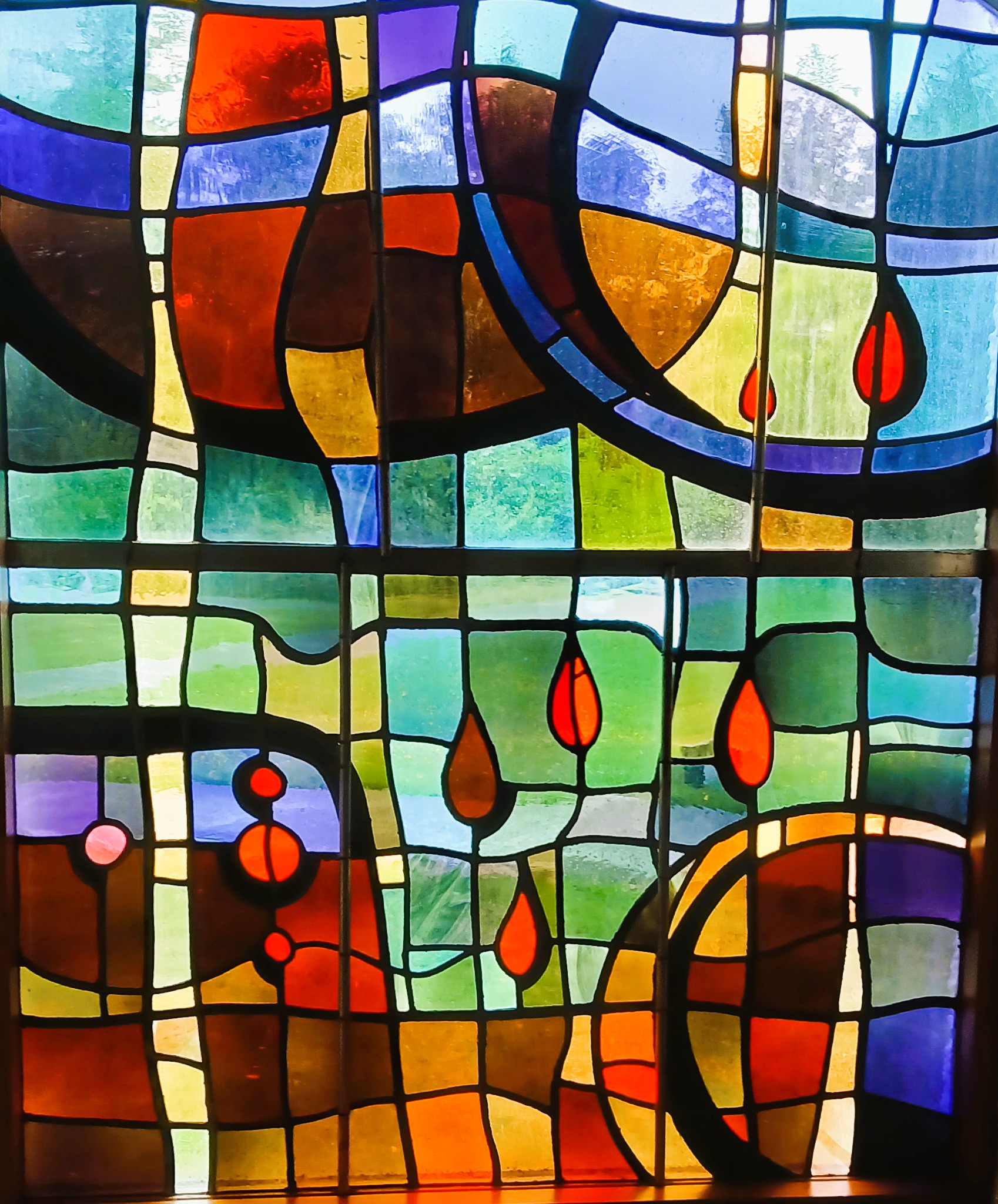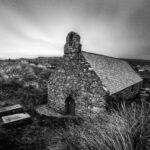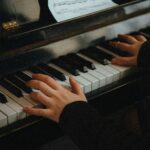Inner Writing
A Different Way of Listening
On holiday in Donegal we visited a Heritage Centre which stocked a large selection of Irish poetry in English and Irish. I was particularly struck by this collection, ‘Darkness Between Stars’ by John F Deane and James Harpur. I would like to share a poem from this book which resonated with a similar experience I had quite a few years ago. Here is the poem first.

Semibreve
I sat, in the island chapel, moor’s edge, winter;
winds groaned and chistled round the walls outside,
the timbers creaked in the afterwarmth,
ghosts from the quenching slipped up through the rafters;
there was a souring emptiness though I sat entranced|
by sacrament and my own minuscule being – when the walls
whispered – Listen! There was no-one. There was nothing.
Even the winds had died. And the chill winterlight
had dimmed. But a tiny chime had happened, vibrated
on my inner listening. The tiniest hint of spittle
tipped against my brow but there was nothing when I wiped
my hand across it. The door moaned again, a sudden breeze
forcing it and I stood, watchful, and shaken. That
was the first semibreve sounded of a gifted music.
I am day and night now, listening. Tuned for it, and waiting.
John F. Deane.
In an old chapel, most probably on the west coast of Ireland, the poet sits in the stillness captivated by the emptiness and his own ‘minuscule being’. It is then he hears ‘a tiny chime…….. vibrated / on my inner listening’. It came to him as the word ‘Listen’.
Some might say it is the imagination or the subconscious, suggesting he did not hear a voice, that is was an illusion or fantasy? I am convinced these ‘tiny chimes’ or vibrations are “gifted music” and come to us from an eternity. They are history bursting into our present because history is alive and very much living in us and around us. Maybe we only ‘hear’ these vibrations when we are quiet or attentive, whatever, for the poet and for myself it came unexpectedly.

A Voice
I have told nobody this story.
During the summer months Jim Cotter used to sit in a very remote church way up in the hills in a place called Llandecwyn (picture above). He would say a simple set of prayers three times a day and welcome visitors. Although this was a very ordinary, even drab looking Victorian Welsh church, it had the most extraordinary presence inside. There was a massive depth of stillness and silence which visitors always commented upon. It was the sort of place where, when walking in, goose bumps would appear on your arms and the hairs on the back of the neck would stand up. It wasn’t spooky it was comfortable like ‘coming home’ but there was something else about this place.
In around the 6th century the Celtic Saint Tecwyn travelled over from Ireland and set up a base on the site of this little church for missionary work. I think he was a hermit and spent his days praying. It was a place where people would come and ask spiritual advice of Tecwyn.
So Jim would sit up there and many would come on those summer days to talk, to enjoy the silence or just look at the most amazing view across the Dwyryd estuary.
One summer Jim invited me to take a turn to sit in the church for a week, to be responsible to ring the bell, say the pattern of prayer and welcome the handful of visitors who arrived. So I spent a week up on that hillside, sometimes in the church, sometimes sunning myself in the grave yard amongst the wild flowers and the deep deep silence. It was a most marvellous week. Maybe over time the stillness and the ‘presence’ of the place made its way deeper into me. Certainly I was sleeping better and there seem to be a lot less ‘shouting’ in my head.
One late afternoon, I think it was Thursday, I was locking up the church at the end of the day, totally alone on the hillside, when I heard a voice. It was defiantly a voice but I was not hearing it with only my ears but it was coming from inside the church. It was a man’s voice and it was saying something like “you think you are strong but you are weak in your prayer” “I have been here for years and years praying, but you leave in the afternoon”. It was like an old man or a master of the inner life being critical of a student.
I was shaken by this voice. It upset me. I locked the church and ran down the church path to my car. I decided it was my imagination so therefore was not real and of no consequence. I thought I was being quite ridiculous, the silence of the place was playing tricks. Of course, I was not going to talk about this or tell anyone.
That night at dinner Jim was asking how thing were up at the church, how many people had visited and had I done some clearing up. Then with a smile on his face he asked what Tecwyn had been saying to me. I asked him what he meant, trying to appear ignorant “what do you mean Jim?” I said. Jim explained he had ‘heard’ a voice in the church and could only conclude it was Tecwyn. I told Jim about me locking the church and how Tecwyn had said he had been praying in the church for hundreds of years. Jim smiled and said no more about it. He was never the one for ‘big significant experiences’. I think he considered this kind of thing an ordinary part of life.
To Conclude
For three hundred years we have had rationality and empirical evidence to ‘prove’ what is true and real. But in this age of Metamodernism these dimensions are being widened. The other day I was listening to a fascinating discussion on the radio between Amol Rjan and Dr Robert MacFarlane. They were discussing the decline in the welfare of our rivers and asking the question, are rivers alive? Dr MacFarlane was suggesting that we broaden the boundaries of rationality. Rivers were seen in ‘the enlightened/rational’ world as commodities to be traded and resources to be plundered. Now, drawing on the wisdom of Indigenous, First Nation people, it is common place for rivers, (and other parts of our living world), to be considered as ‘beings’ with legal rights.
Maybe, in the same way, we can expand our understanding of what rationalists would call ‘imagination’ and the ‘collective conscious’. Perhaps through these lenses we can reappraise the wisdom of those who know the reality and importance of ancestors in their lives and what the church still calls, (but rarely believes in), the ‘cloud of witnesses’ (Hebrews 12). In this way history becomes dynamic and living in us and through us. The saints, those who have gone ahead of us and who are not far from us, bring eternity to the moment as they encourage us on in this journey. I’m sure this is was the “gifted music” Tecwyn gave me on that summers evening at Llandecwyn.
©T. Clapton – please do not reproduce without permission.





I love this. It’s beautifully written, and of course these things happen! A loving God is desperate to communicate with us, his beloved, himself and through his saints, and is only restrained by his deep respect for our independence. It is us who, children of science, have lost the habit of listening.
Thanks Miko – I love the idea of God being ‘desperate’ to communicate with us. How hard it is to to foster the habit of listening. Thanks for that.
“I think he considered this kind of thing an ordinary part of life.”
Ah yes indeed
Lovely piece !
Thank you
Glad you enjoyed this Alice. I really enjoyed putting the piece together over the previous weeks.
Very moving, Tim, and beautifully written. It put me in mind, actually, of the way Australian aboriginal and other `native’ peoples view the world and nature as living, breathing beings – your river image, for example.
Love it!
Yes you are bang on Carole. We are re-learning this from the First Nation people and those who live closer to the Living World. Glad you enjoyed the piece.
Thanks Tim, this piece set so many thoughts going for me. Thanks for sharing your story too, I felt the tingling goosebumps you mention just reading it.
I remember also liking the way John Pritchard wrote about the kinds of places like the church you tell of so I’ve put some of his words here (slight paraphrase):
“These are special places that shiver with subdued holiness. In them we experience this quality of ‘otherness’. They are ‘thin’ places where prayer has proved itself and the walls are soaked in the desires and praises of the people who have lingered there.”
Glad you enjoyed the piece Joel. Thank you also for the paraphrase of John Pritchard – he has that just right. Going into almost any parish church and the prayers of the people are almost tangible. Certainly this was the case of the prison chapel – a very scruffy plain building but there was something very special inside – it was the prayers of the men over the years soaked into the walls. Let me know if you are going to North Wales – would love to direct you to Llendecwyn.